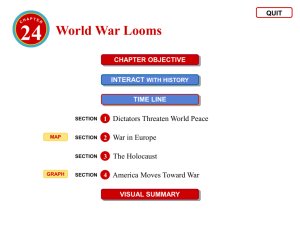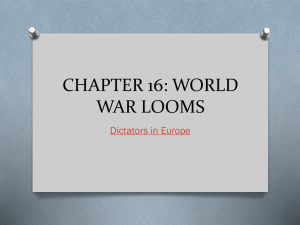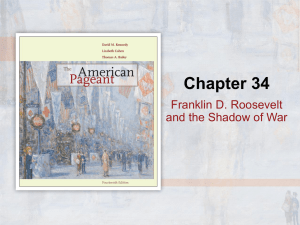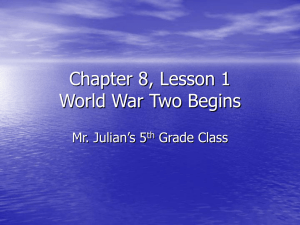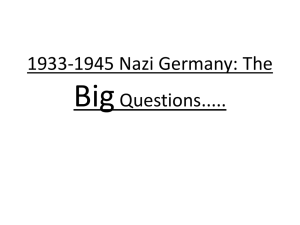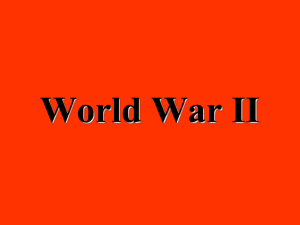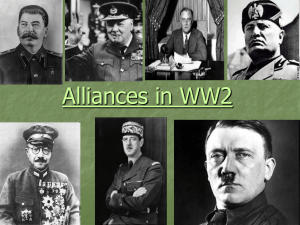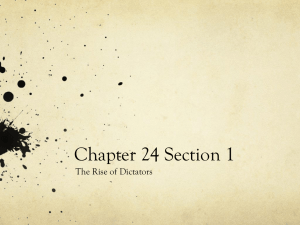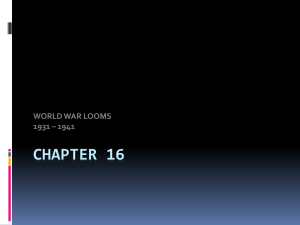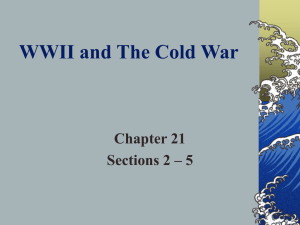World War Looms: Chapter on WWII Origins & US Involvement
advertisement
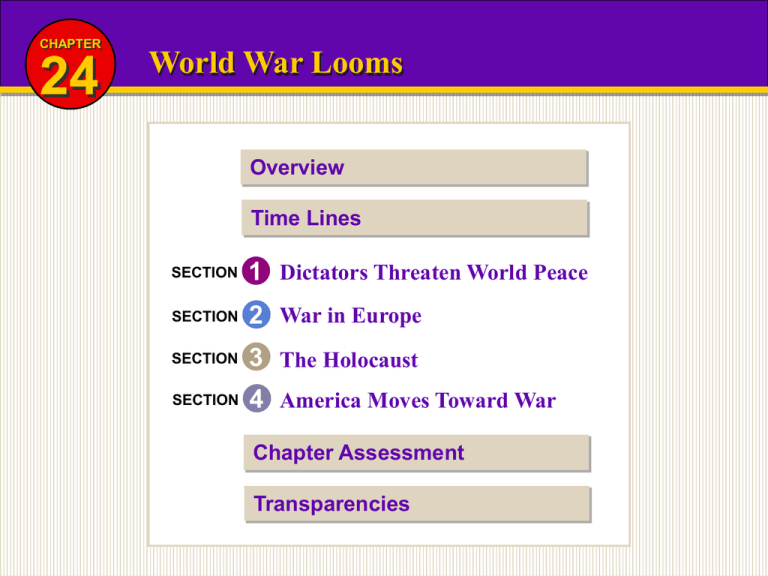
CHAPTER 24 World War Looms Overview Time Lines SECTION 1 Dictators Threaten World Peace SECTION 2 War in Europe SECTION 3 The Holocaust SECTION 4 America Moves Toward War Chapter Assessment Transparencies CHAPTER 24 World War Looms “This nation will remain a neutral nation, but I cannot ask that every American remain neutral in thought as well.” President Franklin Delano Roosevelt, August 24, 1939 THEMES IN CHAPTER 24 Cultural Diversity Science and Technology Immigration and Migration Constitutional Concerns HOME CHAPTER 24 World War Looms What do you know? • What do you already know about World War II? • Have you ever discussed World War II with someone who lived through it? If so, what did he or she say? • What do you know about dictators in the Soviet Union, Italy, Germany, and Japan? How do you think they attained power? • What do you already know about the Holocaust? How have you seen it portrayed in movies, books, and television? HOME CHAPTER 24 Time Line The United States 1935 Congress passes the first Neutrality Act. 1937 President Roosevelt delivers his antiisolationist “quarantine” speech. 1941 The United States enters the war after the Japanese attack on Pearl Harbor. President Roosevelt signs the LendLease Act, and U.S. industry begins mass production of war materiél. HOME CHAPTER 24 Time Line The World 1931 Japan invades Manchuria. 1933 Hitler becomes chancellor of Germany. 1935 Mussolini invades Ethiopia. 1936 The Spanish Civil War begins. Germany occupies the Rhineland. 1937 Japan invades China. 1938 Germany annexes Austria. 1939 Germany invades Poland, starting World War II. The Nazis begin to convert labor camps into extermination camps. 1940 Britain and Germany fight the Battle of Britain. Japan, Germany, and Italy sign pact. 1941 Germany invades the Soviet Union. Japan attacks Pearl Harbor. HOME SECTION 1 Dictators Threaten World Peace Learn About the rise of totalitarian dictatorships in Europe and Asia. To Understand the challenge they posed to the U.S. policy of neutrality. HOME SECTION 1 Dictators Threaten World Peace Key Idea The United States remains isolated from world affairs as economic and political factors lead to the rise of nationalist leaders in the Soviet Union, Germany, and Italy. HOME SECTION 1 Dictators Threaten World Peace HOME Section 1 Assessment SUMMARIZING What were the main ambitions of European dictators Stalin, Mussolini, and Hitler? Ambitions of European Dictators Stalin Mussolini Hitler To create a model To make Italy a great To unite the German Communist world power “master race” into an state and to transform empire destined to the Soviet Union into rule the world a great industrial power SECTION 1 Dictators Threaten World Peace Section 1 Assessment ANALYZING CAUSES How did the Treaty of Versailles sow the seeds of instability in Europe? THINK ABOUT • effects of the treaty on Germany and the Soviet Union • effects of the treaty on national pride • the economic legacy of World War I HOME SECTION 1 Dictators Threaten World Peace Section 1 Assessment ANALYZING MOTIVES Why do you think Hitler found widespread support among the German people? THINK ABOUT • Germans’ postwar resentment and bitterness • Germany’s economic situation before Hitler’s rise to power • the appeal of Hitler’s Nazi beliefs HOME SECTION 2 War in Europe Learn About the weak response of world leaders to Hitler’s aggressive moves in the late 1930s. To Understand how Germany started World War II. HOME SECTION 2 War in Europe Key Idea A series of bold moves by Adolf Hitler— and weak countermoves by other leaders— triggers World War II in Europe. HOME SECTION 2 War in Europe HOME Section 2 Assessment FOLLOWING CHRONOLOGICAL ORDER In what sequence did the following events occur: Germany’s invasion of Poland, Hitler’s annexation of Austria, signing of the nonaggression pact, signing of the Munich Pact? EVENT 2 EVENT 4 signing of the Munich Pact Germany’s invasion of Poland Hitler’s annexation of Austria EVENT 1 signing of the nonaggression pact EVENT 3 SECTION 2 War in Europe Section 2 Assessment SYNTHESIZING To what extent do you think lies and deception played a role in Hitler’s tactics? THINK ABOUT • William Shirer’s diary entry about headlines in the Nazi newspapers • Soviet-German relations • Hitler’s justifications for military aggression HOME SECTION 2 War in Europe Section 2 Assessment MAKING DECISIONS If you had been a member of the British House of Commons in 1938, would you have voted for or against the Munich Pact? THINK ABOUT • Hitler’s credibility • the British public’s fear of being involved in another war • Churchill’s opinion of the appeasement policy HOME SECTION 3 The Holocaust Learn About Hitler’s plans for the German “master race”. To Understand the fate of Jews and other “enemies” of the Third Reich. HOME SECTION 3 The Holocaust Key Idea Hitler’s plans for conquering the world include the killing of Jews and other ethnic groups, which is carried out with frightening determination and success. HOME SECTION 3 The Holocaust HOME Section 3 Assessment 3 ANALYZING CAUSES What were at least four events that led to the Holocaust? CAUSES EFFECT the removal of non-Aryans from government jobs Nuremberg Laws stripping Jews of their civil rights and property Kristallnacht—Nazi storm troopers’ attack on Jewish homes, businesses, and synagogues “final solution”—systematic genocide of Jews, gypsies, and other groups that Nazis considered “subhuman” The Holocaust SECTION 3 The Holocaust Section 3 Assessment 3 SUPPORTING OPINIONS Do you think that the United States was justified in not allowing more Jewish refugees to emigrate? Why or why not? THINK ABOUT • the views of isolationists in the United States • some Americans’ prejudices and fears • the incident on the German luxury liner, St. Louis HOME SECTION 3 The Holocaust Section 3 Assessment DEVELOPING HISTORICAL PERSPECTIVE Why do you think the Nazi program of systematic genocide was so brutally effective? THINK ABOUT • the long German history of anti-Semitism • the secrecy and lies told by the Nazis • the scope and organization of the Nazis’ genocidal plans HOME SECTION 4 America Moves Toward War Learn About the American response to aggression in Europe and Asia. To Understand how the United States entered World War II. HOME SECTION 4 America Moves Toward War Key Idea The United States provides aid to nations resisting Hitler and enters World War II after the bombing of Pearl Harbor. HOME SECTION 4 America Moves Toward War HOME Section 4 Assessment SUMMARIZING What were some of the key events that led to the U.S. entry into World War II? March 1941 August 1941 Congress passes LendLease Act. Roosevelt and Churchill draw up Atlantic Charter. September 1940 June 1941 December 1941 Japan, Germany, and Italy sign the Tripartite Pact. Germany invades Soviet Union; Roosevelt orders U.S. Navy to protect lend-lease shipments. Japan bombs Pearl Harbor. SECTION 4 America Moves Toward War Section 4 Assessment FORMING OPINIONS Do you think the the United States should have waited to be attacked before declaring war? THINK ABOUT • the reputation of the United States • the influence of the isolationists • the destruction of Pearl Harbor HOME SECTION 4 America Moves Toward War Section 4 Assessment CLARIFYING Although the U.S. Congress was still unwilling to declare war early in 1941, Churchill told his war cabinet, “We must have patience and trust to the tide which is flowing our way, and to events.” What do you think Churchill meant by this remark? THINK ABOUT • Roosevelt’s series of “unneutral” steps to assist Great Britain in its war efforts • the Atlantic Charter • Churchill’s view of Hitler HOME Chapter 24 Assessment 1. What were Stalin’s goals and what steps did he take to achieve them? 2. What actions that the League of Nations took revealed its inability to control the aggressive moves of Japan, Germany, and Italy? 3. How did Germany’s and Italy’s involvement affect the outcome of the Spanish Civil War? 4. Why was the blitzkrieg an effective military strategy? 5. What terms of surrender did Hitler demand of French officers after the fall of France in 1940? What was General Charles de Gaulle’s reaction? HOME Chapter 24 Assessment 6. What groups did Nazis deem unfit to belong to the Aryan “master race”? 7. How did some Europeans show their resistance to Nazi persecution of the Jews? 8. Which nations formed the Axis powers? What were the military implications of the Tripartite Pact for the United States? 9. What congressional measures paved the way for the United States entry into World War II? 10. Why did the United States enter World War II? HOME
